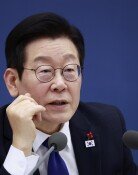[Opinion] Anti-Korean Sentiment in China
[Opinion] Anti-Korean Sentiment in China
Posted December. 12, 2007 03:03,
China is Koreas largest trade partner, and four out of 10 foreigners living in Korea are Chinese, the largest proportion of any nationality. About 20,000 Chinese students come to Korea every year, accounting for 61 percent of Koreas total number of foreign students. Half of all of Koreas foreign brides are from China.
However, the relationship between Korea and China is a different story. International Herald Leader, a subsidiary weekly of Xinhua News Agency, polled 12,000 Chinese found that Korea ranked first in terms of neighbors that the Chinese do not like (40 percent).
Some analyze that the poll result comes from deeply-rooted Sinocentric attitudes of the Chinese or it may be due to Koreans who act like overnight millionaires in China. There is another analysis that the more they learn each other, the more they like and dislike.
Japan was picked as Chinas third favorite country and ranked second as the country the Chinese do not like. The Sankei newspaper interpreted that the result shows a love-hate relationship with Japan as well, mentioning that Chinese are interested in Japan anyway.
A domestic expert on China attributes resentment toward Korea to the internet. The expert added that some, who are fluent in Korean, may be encouraging negative sentiment toward Korea by delivering Korean news items that are unfriendly to China. Those internet media more depend on nationalism than do state-run media.
When the fake cardboard dumpling story hit Korea in August, the rap-music video, which asserts that Koreas economic growth was possible thanks to U.S aid, was circulated on Chinese websites.
Takahara Motoaki, a Japanese scholar, describes anti-Koreanism in China, anti-Japanese sentiment in Korea and China, and anti-Chinese feelings in Korea and Japan as an expression of neo-nationalism in his new book about the rise of the internet generation in those three nations. He also said that youngsters in those three countries tend to ascribe their concerns about the future caused by job instability to their neighbors. The 880,000-won generation (non-regular workers in their 20s who receive 880,000 won monthly) of the three nations are spreading a virulent brand of nationalism.
Editorial Writer Heo Mun-myeong, angelhuh@donga.com







